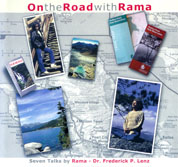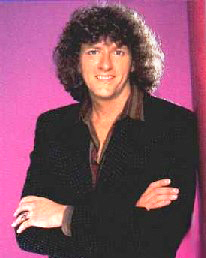
On the Road with Rama
Transcendentalism
The day is August 15th. The location is Walden Pond in Concord, Massachusetts.
The time is 6:30 p.m. I just took a walk around Walden - it's about a 1.8 mile hike - and I stopped for a while at the site of Thoreau's house. They've roped off an area where they discovered the foundation. Occasionally a car is driving back and forth here. It's a sweltering evening. It was in the 90's all day, and the pond is a mecca to swimmers right now. The pond, for those of you who don't know, serves as a beach in the summer, and it has some of the cleanest water in New England.
Our subject tonight is transcendentalism - the awareness of eternity in the present. We ask questions. What is life? What is its purpose? Does it have a meaning? What is our role in the lila and the cosmic game? How can I find where I belong? Do I belong in this world? Is there a God? If there is a God, what kind of God would make a place like this, where everyone suffers and dies and experiences some transitory happinesses and pleasures?
Transcendentalism answers these and other questions, not so much with verbal answers or with a singular philosophy, but by suggesting that there are layers of reality, and that the average individual only sees one or two of these layers perhaps in an entire lifetime. But one who is not average, a person who turns their attention inward or who looks with the outward eye but probes beyond the surface, can see that there are other layers or spheres of reality. The world we see with our senses is a world of appearances - a world of action and interaction, a world of birth and death.
We come into the world and we exist for a while. We learn about our world. We learn the necessary skills to survive for as long as we do. One day, nature appears to overpower us and we leave this world. We die - we cease to exist. Transcendentalism suggests that we are all part of an oversoul. While we have separate finite physical bodies, individual personalities and individual experiences, these are all really a covering. If we could uncover ourselves, if we could remove these layers, then we would see underneath that we're made of something else - that we're made of a light, energy, which the Transcendentalists, of course, referred to as the oversoul. The oversoul that is in one person is essentially the same oversoul that's in another person - in a tree, in a dog, in a cat, in a planet, in a universe, in an age in the past or the future or the present.
As I'm sitting talking to you, I'm watching a squirrel. I'm sitting here in the Dodge van and I'm watching this cute little guy hop back and forth, apparently oblivious to our technologically oriented civilization. He's out there in his world, a world of trees and nuts and wind and rain and sunshine - completely unaware of the things that we are aware of, and, of course, we are unaware of the things that he is aware of. So transcendentalism suggests that we are aware of our world, the average person. But we are completely oblivious to a world that may be right next to us. It might be right inside of us - not inside of our bodies per se, but inside of our attention, our consciousness.
Thoreau, Emerson and others were Transcendentalists. And there's a power in the land here in Concord, in Lincoln, in this area - the western Boston suburbs - there's a power here. There's an inter-dimensional vortex that opens in a variety of places in this area, which leads one to a transcendental reality. This is what we call a place of power.

